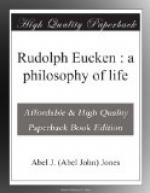Eucken is not reluctant to give the theory all the credit it deserves, and he is prepared to admit that it fulfils to some extent the conditions which he holds a satisfactory solution should fulfil.
He goes, however, immediately to the root of the matter, and finds that the very existence of the theory of naturalism in itself is an eloquent disproof of the theory. The existence of a comprehensive scientific conception involves an activity which is far superior to nature itself, for it can make nature the object of systematic study. An intellect which is nothing more than a mirror of sense impressions can get little beyond such sense impressions, whereas the highly developed scientific conception of nature that obtains to-day is far beyond a mere collection of sense impressions. Nature, indeed, is subdued and mastered by man; why then degrade man to the level of a universe he has mastered? To produce from the phenomena of nature a scientific conception of nature demands the activity of an independent, originative power of thought, which, though it may be conditioned by, and must be related to, sense impressions, is far above mere sense impressions.
Naturalism, in directing attention to the things that are experienced, fails to take proper account of the mind that experiences them; it postulates nature without mind, when only by the mind processes can man become aware of nature, and construct a naturalistic scheme of life. “To a thorough-going naturalism, naturalism itself is logically impossible.” Hence the impossibility of the naturalistic theory as an explanation of life.
Then it fails to provide a high ideal for life, and to release man from sordid motives. It gives no place for love, for work for its own sake, for altruistic conduct, or for devotion to the high ideals of life. The aim of life is limited to this world—man has but to aim at the enjoyment and preservation of his own life. The mechanical explanation of life, too, does away with the possibility of human freedom and personality, and it is futile to urge man to greater efforts when success is impossible. It is a theory which does justice merely to a life of pleasure and pain, its psychology has no soul, and its political economy bases the community upon selfishness.
In this way Eucken disproves the claim of naturalism; in doing so he points out that a satisfactory solution must take account of the life of nature in a way which religion and idealism have failed to do.
Of late years Socialism and Individualism have come into prominence as theories of life. Eucken attributes the movements in the first instance to the receding into the background of the idea of an overworld which gave meaning and value to life. When doubt was thrown upon religion and idealism, when confidence in another world was shaken, man lost to an extent his moral support. Where could he turn now for a firm basis to life? He might,




